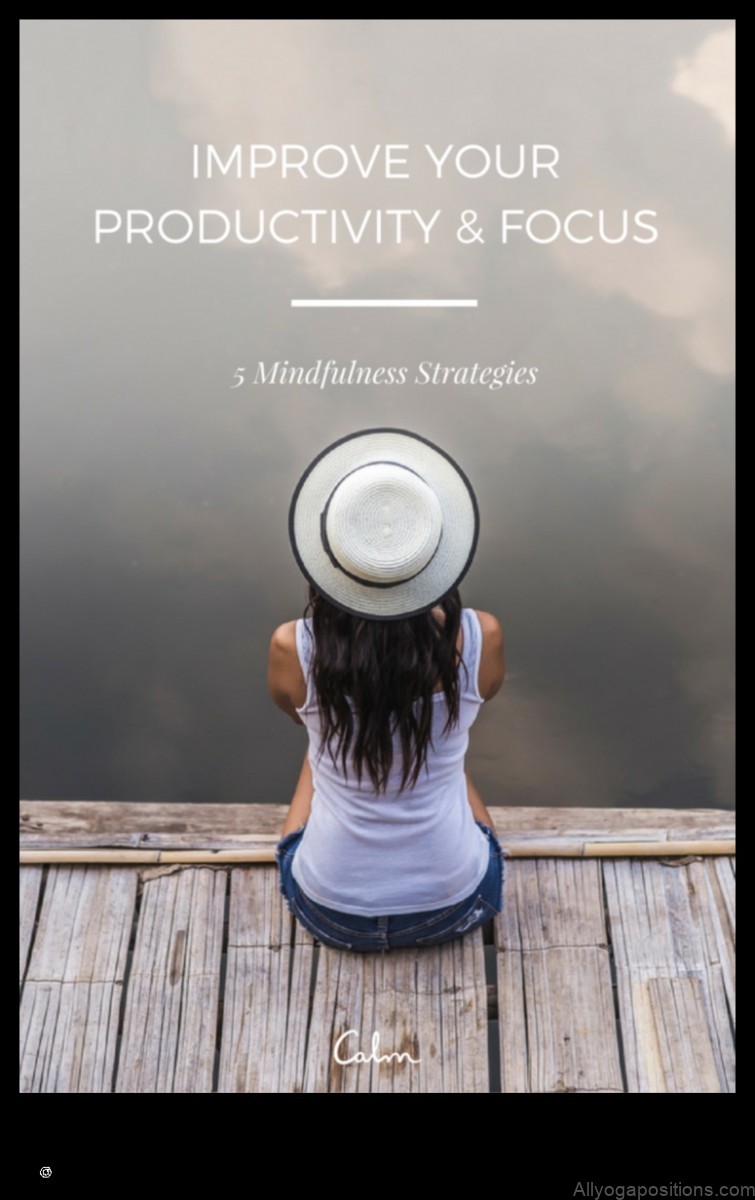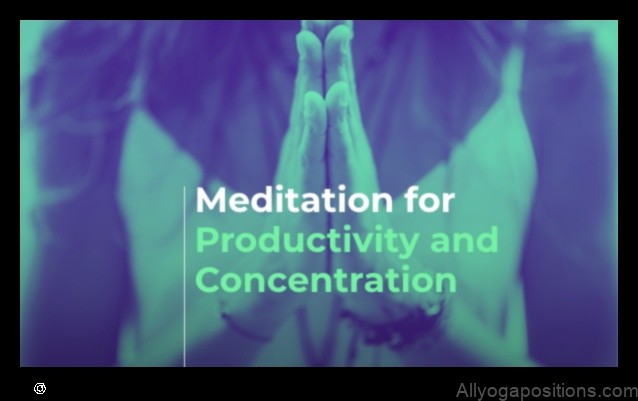
Meditation for Productivity: Enhancing Focus and Efficiency
Meditation is a practice that has been shown to have a number of benefits for both physical and mental health. In recent years, there has been increasing interest in the potential of meditation to improve productivity and focus.
There are a number of ways in which meditation can help to improve productivity. First, meditation can help to reduce stress and anxiety. This can lead to a calmer and more focused state of mind, which is conducive to productivity.
Second, meditation can help to improve attention and concentration. When you meditate, you are training your mind to focus on a single object or thought. This can help you to stay focused on your work or tasks, and to avoid distractions.
Third, meditation can help to improve creativity and problem-solving skills. When you meditate, you are allowing your mind to wander and to come up with new ideas. This can be helpful for brainstorming and solving problems.
If you are looking to improve your productivity and focus, meditation is a helpful tool that you can use. There are a number of different meditation techniques that you can try, so you can find one that works for you.
Here are some tips for beginners on how to meditate for productivity:
- Find a quiet place where you can meditate without distractions.
- Sit in a comfortable position with your back straight.
- Close your eyes and focus on your breath.
- Breathe in and out slowly and deeply.
- As you breathe, let go of any thoughts or worries that come into your mind.
- Continue to meditate for as long as you like.
If you are new to meditation, it may be helpful to start with short meditation sessions of 5-10 minutes. As you get more comfortable with meditation, you can gradually increase the length of your sessions.
Meditation is a practice that takes time and commitment to see results. However, if you are consistent with your practice, you will likely see improvements in your productivity and focus.
Here are some common myths about meditation:
- Meditation is only for religious people.
- Meditation is too difficult to learn.
- Meditation makes you lazy.
These are all myths. Meditation is not exclusive to any religion, it is not difficult to learn, and it does not make you lazy. In fact, meditation can help you to be more productive and focused.
If you are interested in learning more about meditation, there are a number of resources available. You can find books, articles, and online courses on meditation. You can also find meditation classes in your local community.
Meditation is a powerful tool that can help you to improve your productivity and focus. If you are looking for a way to enhance your mental and physical health, meditation is a great option.
Meditation for Specific Productivity Goals
In addition to improving overall productivity and focus, meditation can also be helpful for specific productivity goals. For example, meditation can help you to:
- Improve your memory
- Increase your creativity
- Solve problems more effectively
- Manage stress
- Be more mindful
- Improved focus and concentration
- Reduced stress and anxiety
- Increased creativity and problem-solving skills
- Improved mood and energy levels
- Enhanced decision-making skills
- Find a quiet place where you won’t be disturbed.
- Sit in a comfortable position, either cross-legged on the floor or in a chair with your feet flat on the ground.
- Close your eyes and focus on your breath.
- When your mind wanders, gently bring your attention back to your breath.
- Continue for 5-10 minutes, or for as long as you like.
-
You have to be good at sitting still to meditate.
-
Meditation is only for religious people.
-
Meditation will make you sleepy.
-
Meditation is a waste of time.
- Set a specific time and place each day for meditation.
- Make it a priority. Just like you wouldn’t skip a doctor’s appointment or a work meeting, don’t skip your meditation time.
- Start with small increments of time. Even five minutes of meditation can be beneficial.
- Find a meditation technique that you enjoy and that fits your lifestyle. There are many different types of meditation, so experiment until you find one that you find relaxing and enjoyable.
- Be patient with yourself. It takes time to develop a meditation practice. Don’t get discouraged if you don’t see results immediately. Just keep practicing and you will eventually see benefits.
- Increased focus: Meditation can help you to focus more on your work by reducing distractions and improving your ability to stay on task.
- Reduced stress: Stress can lead to procrastination and difficulty concentrating, so reducing stress can help you to be more productive.
- Improved decision-making: Meditation can help you to make better decisions by improving your ability to think clearly and rationally.
- Increased creativity: Meditation can help you to be more creative by opening up your mind to new ideas and possibilities.
- Improved time management: Meditation can help you to manage your time more effectively by helping you to stay focused on your goals and avoid distractions.
- Headspace – Headspace is a popular meditation app that offers guided meditations for beginners and experienced meditators alike.
- Calm – Calm is another popular meditation app that offers a variety of features, including guided meditations, sleep stories, and music.
- Insight Timer – Insight Timer is a free meditation app that offers a wide variety of meditations, as well as a community forum where you can connect with other meditators.
- Mindfulness in Plain English – This book by Bhante Henepola Gunaratana is a classic introduction to meditation.
- The Power of Now – This book by Eckhart Tolle is a popular guide to mindfulness and spiritual awakening.
- Waking Up with Sam Harris – This podcast by Sam Harris explores the science and philosophy of meditation.
- A Guide to Exploring Different Yoga Styles From Hatha to Vinyasa and Beyond
- Mindful Muse Yoga for Creative Expression Balanced Approach to Unlock Your Full Creative Potential
- The Dance of Shiva A Dynamic Yoga Journey Through the Chakras
- Yoga and Mental Health A Mindful Path to Emotional Well-being
- Zen Yoga Zephyr Find Your Inner Peace
| Topic | Features |
|---|---|
| Meditation for Productivity | Focus |
| Meditation for Productivity | Efficiency |
| Meditation for Productivity | Mindfulness |
| Meditation for Productivity | Concentration |
II. Benefits of meditation for productivity
Meditation has been shown to have a number of benefits for productivity, including:

III. How to meditate for productivity
Meditation is a practice that has been shown to have a number of benefits for both physical and mental health. In recent years, there has been growing interest in the potential of meditation to improve productivity.
There are a number of ways that meditation can help to improve productivity. First, meditation can help to reduce stress and anxiety. This can make it easier to focus and concentrate on tasks. Second, meditation can improve your ability to manage your time and stay organized. Third, meditation can help to boost your creativity and problem-solving skills.
If you are looking to improve your productivity, meditation can be a helpful tool. However, it is important to note that meditation is not a quick fix. It takes time and practice to develop the skills necessary to meditate effectively.
If you are new to meditation, it is important to start slowly. Try meditating for a few minutes each day and gradually increase the amount of time you meditate as you become more comfortable with the practice.
There are a number of different ways to meditate. You can find a variety of guided meditations online or in books. You can also learn to meditate on your own.
If you are struggling to meditate, there are a few things you can do to help yourself. First, find a quiet place where you will not be disturbed. Second, make sure you are comfortable. Third, close your eyes and focus on your breath. Fourth, let go of any thoughts that come into your mind. Fifth, be patient with yourself and don’t expect to be perfect right away.
Meditation is a powerful tool that can help you to improve your productivity and overall well-being. If you are looking for a way to reduce stress, improve your focus, and boost your creativity, meditation is worth considering.
IV. Tips for beginners
Meditation can be a challenging practice, especially for beginners. Here are a few tips to help you get started:
It may take some time to get used to meditating, but don’t give up. With practice, you’ll be able to sit for longer periods of time and experience the benefits of meditation.
V. Common myths about meditation
There are many myths about meditation that can prevent people from trying it. Here are some of the most common myths, and the truth behind them:
The truth is, anyone can meditate, regardless of their age, ability, or religious beliefs. Meditation is not about sitting still perfectly. It is about being present and aware of your thoughts and feelings. Meditation can actually help you to feel more energized and focused.
If you are interested in learning more about meditation, there are many resources available online and in libraries. You can also find meditation classes at your local community center or yoga studio.

VI. How to make meditation a habit
Meditation is a skill that takes practice to develop. If you’re new to meditation, it’s important to be patient with yourself and don’t get discouraged if you don’t see results immediately. The key is to make meditation a regular part of your routine and to gradually increase the amount of time you spend meditating each day.
Here are a few tips for making meditation a habit:
VII. Meditation for specific productivity goals
Meditation can be used to improve productivity in a variety of ways. Here are a few specific ways that meditation can help you be more productive:
If you are looking to improve your productivity, meditation can be a helpful tool. By practicing meditation regularly, you can learn to focus better, reduce stress, make better decisions, and be more creative. This can all lead to increased productivity and success in your personal and professional life.
Meditation apps and resources
There are many different meditation apps and resources available, so it can be helpful to do some research to find one that is right for you. Some popular options include:
In addition to these apps, there are also many books, websites, and podcasts that can teach you about meditation. Some popular resources include:
No matter which method you choose, the most important thing is to find a meditation practice that you enjoy and that fits into your lifestyle. With regular practice, meditation can help you to improve your focus, productivity, and overall well-being.
IX. Research on meditation and productivity
There is a growing body of research on the benefits of meditation for productivity. A 2011 study by the University of California, Berkeley found that meditation can improve focus and attention, which can lead to increased productivity. A 2012 study by the University of Sussex found that meditation can reduce stress and anxiety, which can also lead to increased productivity. A 2014 study by the Harvard Business School found that meditation can improve creativity and problem-solving, which can also lead to increased productivity.
Overall, the research suggests that meditation can be a helpful tool for improving productivity. However, it is important to note that meditation is not a magic bullet. It takes time and practice to see the benefits of meditation. If you are interested in using meditation to improve your productivity, it is important to find a meditation practice that works for you and to stick with it for at least a few weeks before you see results.
X. FAQ
Q: What is the difference between meditation and mindfulness?
A: Meditation and mindfulness are often used interchangeably, but there are some key differences between the two practices. Meditation is a formal practice that involves sitting in a quiet place and focusing on your breath or a mantra. Mindfulness is a more informal practice that can be done anywhere, and it involves paying attention to your thoughts and feelings without judgment.
Q: How long does it take to see benefits from meditation?
A: The benefits of meditation can vary from person to person, but most people start to see some benefits within a few weeks or months of regular practice. Some of the benefits of meditation include improved focus, reduced stress, and increased happiness.
Q: What are the challenges of meditating?
A: There are a few challenges that people can face when they start meditating, including distractions, boredom, and frustration. It’s important to be patient and persistent when you’re first starting out, and to remember that everyone experiences challenges when they’re learning a new skill.
Table of Contents
